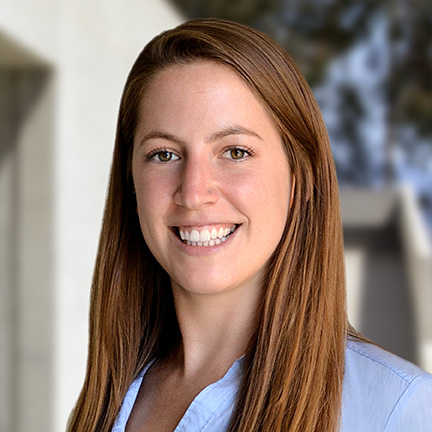A conversation with: Danielle Grotjahn, PhD, Scripps Research Fellow
Published:
August 13, 2019
Author:
Office of Marketing and Communications

Part 2 (Read Part 1 of our Q&A with Danielle here)
How did the Scripps Fellows Program come on your radar? And what are the latest updates with your lab?
Well I knew I wanted to pursue cellular imaging and I originally intended on doing a post-doc. In the process of doing interviews across the US, I heard about the Fellows Program at Scripps Research. Since the institute had invested so much in high-resolution cryogenic electron microscopy (cryo-EM), I thought that they might be interested in moving in this cellular direction. It turns out that was true, which influenced my decision to apply and provide for them this niche that they could move into. The great thing about the program is that it definitely gives you a head start in your longer-term academic career. It’s designed for people with a strong vision of what they want to do, so the idea is to foster those ideas and see what they’re capable of.
The other Fellows on the program have been so helpful with navigating how to set up your own lab space. I’m now trying to pay that forward; we have more Fellows joining this year and I’ve had phone conversations with them to share my advice. Currently, I’m mostly concentrating on setting up the lab and getting all the imaging equipment up and running. I have a graduate student in the lab and then a post-doc who is about to join. I was very fortunate to find great people, who kind of found me instead. I actually think my presence on Twitter might be part of the reason why. The EM community is small but very active on social media; every day is like being at a conference.
What advice would you give other graduate students on a similar track?
Being a scientist requires a lot of different skills. We always think of the obvious ones, like being analytical or scientific writing skills. But there are many other skills you should think about, such as being able to interact with others; not just for your own productive lab environment, but to form collaborations or talk to reviewers etc. Outside of that, the science communication is also important for being able to explain your work to a wider audience. For me, a big breakthrough was to stop comparing myself to others in terms of success or knowledge. Instead, I accepted and harnessed what strengths I had, while then having a good attitude and patience with things I still needed to improve upon.
So what’s your life like outside of the lab? Rumor has it you’re a bit of a hippie at heart?
Ha! Well okay, I grew up with, I guess you could say, hippie parents. For example, I would go to Grateful Dead concerts from a very young age. So I suppose I’ve embraced the musical aspects of that identity at least. And I do now live in Ocean Beach; I went there and it certainly felt like it was my vibe. In general, music has been a big part of my life and I find it really motivates me, so you’ll often find me in my office wearing my noise-cancelling headphones. When the music goes on my concentration is then spot-on; it helps me to write, it helps me to think. In terms of hobbies, I’m not a fitness junkie or anything, but I like to stay really active, which complements all that time spent in the microscope room. I like a bit of everything: yoga, spin class, hiking and running. Yoga especially has taught me patience and good breath control, which I have then consciously been able to apply at work.
Learn more about the Scripps Research Fellows Program here

